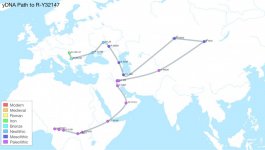Well, that makes us even, because I don't understand yours.

We are discovering more and more that most of what makes us, "us", is heritable to one degree or another: not just appearance, but health, i.e. propensity to certain diseases, both physical and mental, musculature, athletic ability, intelligence, most personality traits. The percentages vary but heredity is very important in all of them.
That heredity is transmitted through your autosomes. Yes, my father's male line ancestor arrived in Italy around 4,000 years ago from Central Europe probably, speaking a steppe language and carrying a steppe ydna. Did that make my father Ukrainian, or a steppe person or even a Central European? Imo that would be a silly conclusion. My father was Italian, and proud of it, and therefore a Southern European. Or, consider my mtDna ancestress. MtDna at least has a lot of health consequences, but in terms of cultural identity, what do I have to do with some tribal steppe woman wandering the frozen wastes of Northern Eurasia? That was a rhetorical question.

Nothing.
Or, take Latin America, where you can see this sort of thing more starkly. How is some Peruvian highlander who carries R1b but is 95% indigenous Amerindian supposed to see himself? Would it make sense for him to be preening himself about the conquering ability of his Iberian ancestors?
You see something not quite as extreme but in a similar vein in our Northeastern and North-central American Indians; many of the men carry R1b, but they are majority, sometimes extreme majority Amerindian. The examples are endless. Look at the South Asians in the northwest of India.
So, fine, the yDna may tell you the path one of your male ancestors took to arrive in your area, but the total genetic package which makes you, "you", comes from your autosomes.



